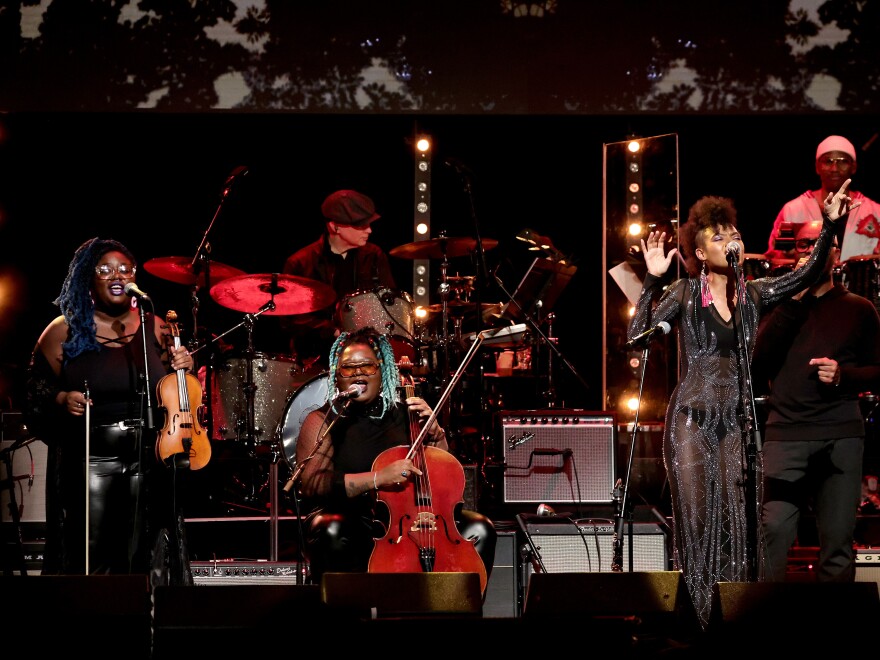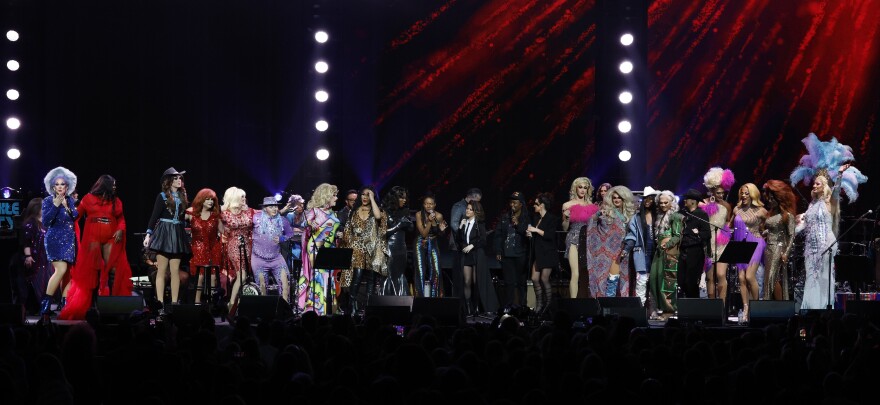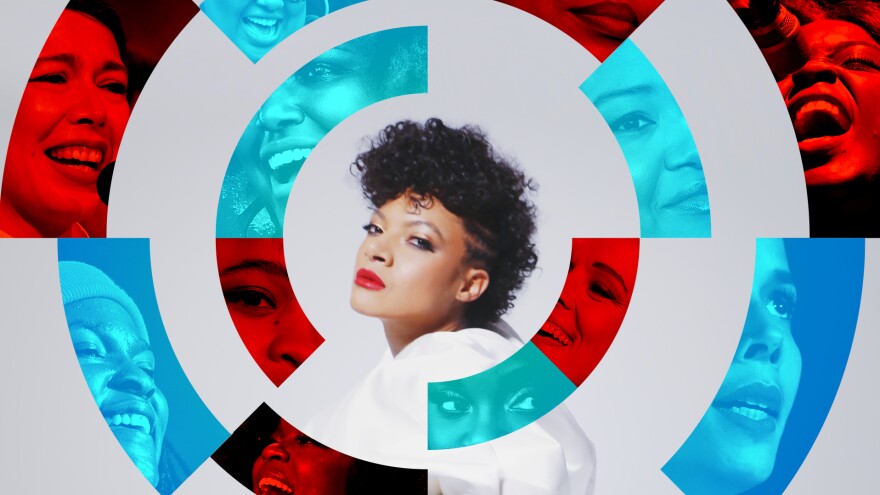2021 was not, technically, the first year Allison Russell played the Newport Folk Festival. Russell had previously taken the stage at what's long been a venerated showcase of bearers and updaters of tradition with her bands Birds of Chicago and Our Native Daughters, but never before as a solo artist. And never with as bright a spotlight as the one that followed the release of her album Outside Child. That was her first work under her own name, and it compelled critics and fans to regard her in a new light, as a visionary artist telling a tale that only she could: of how white supremacist, familial trauma might have done her in, if she hadn't fashioned her own imaginative liberation.
Russell's solo arrival earned her pride of place at Newport: the leader of the festival's culminating celebration, its Sunday night "superjam." But rather than basking in the spotlight she'd secured for herself, Russell took the opportunity to act as an organizer, inviting an array of roots-savvy musical peers, all Black women — Adia Victoria, Kam Franklin, Yola, Amythyst Kiah, Sunny War, Joy Oldokun and Celisse among them — to join her. Monique Ross, a cellist who first played alongside Russell on that stage, still looks back and marvels. "It was like nothing I've ever experienced, not only for being people of color, but women of color," Ross says. "She was very intentional with that. When you go to music festivals, that's not what you usually see."
As the next two years would prove, Russell was intent on complicating the public's perception of her rising star, and Newport was only phase one. She went about the task with a deeply held sense of purpose: to transcend the historically gendered and racialized musical models she found limiting.
As scholar Jack Hamilton illustrates in Just Around Midnight: Rock and Roll and the Racial Imagination, with the rise of the white, male rock genius in the '60s, towering value came to be placed on individual authorship and artistic daring that was recognized only in particular kinds of performers, a value system that's persisted in popular music. "The recognition of white people as individuals while recognizing nonwhite people only in relation to collectives is a hallmark of racism across all areas of culture," Hamilton writes. Seeing an opening, Russell was determined to undermine that binary.
Her most exquisite subversion lies in how she's come to embody a critique and revision of 21st century artistic brilliance, proving that her magnetic voice registers most potently as she orchestrates genuinely communal creativity. "It's not about one person having a moment," she affirms in her East Nashville living room, as her dog pouts on the sofa, awaiting a walk. "It's about the strength of the circle growing and growing and growing, and including more and more and more people within that."
She'd felt the aesthetic boundaries erected around white definitions of roots music, rules enforced especially "tyrannically" in the abusive household of her youth where classical music held sway (as in, "I wasn't allowed to listen to anything written after 1895," she says). And Russell saw a way of freeing herself and her collaborators from the onerous burdens placed on performers of color, who are expected to affirm the authenticity of their output within those confines.
When she titled that Newport superjam "Once and Future Sounds," she was sketching out a template expansive enough to encapsulate both historical excavation and Black musical innovation. Always quick to acknowledge that she stands on the shoulders of unsung predecessors, particularly Black banjo players, who looked like her, she's also let herself be drawn forward, toward the electronically enhanced dance floor explorations of the disco era and beyond, music often viewed as suspect and synthetic by roots standards.

Chaka Khan was the musical elder on hand to consecrate the superjam by doing a couple of her sleek, cosmopolitan late '70s and early '80s hits, "I'm Every Woman" and "Ain't Nobody." All around her, two or three to a mic, the younger performers formed an exuberant chorus. Russell, rocking an iridescent rainbow jumpsuit, jumped around and pumped her arms in the air. "Those songs were as much roots canon as 'Goodnight Irene' or 'Four Strong Winds' or 'Will the Circle Be Unbroken' or any of the things that everybody knows every word to," says Russell. "Those songs did that same work at Newport. It was a group sing." She recalls realizing then "that we could play that music with abandon," and wanted to hold onto that feeling, and eventually, see what she could do with it when she made what would become her newly released second album, The Returner.
The Allison Russell known to avid folkies for the better part of the last two decades had been a consummate collaborator who made generous and distinctive contributions to a succession of bands. Her sinuous melodies and feathery vibrato warmed virtually everything they touched in the countrified jazz combo Po' Girl, in Birds of Chicago, her soulful, shape-shifting folk-rock duo with husband J.T Nero, and the brief but important all-Black string band Our Native Daughters, convened by Rhiannon Giddens. Always, Russell's creative ambition came with a sense of responsibility. "I didn't want to have unrealistic expectations of what was possible," she explains. "I was just trying to show up as bravely and authentically as I could with each opportunity that appeared."
Russell had watched, and benefited from, how a couple of other artists in her realm used their platforms: how Giddens became the model of scholarly virtuosity and solidarity; how Brandi Carlile turned her gallant classic rock confessionalism toward advocacy.
After shopping Outside Child around a bit and receiving belittling responses from labels, Russell tentatively DMed Carlile, whose own long-simmering success had recently exploded, in 2020. Carlile wrote back, rhapsodizing about Russell's song cycle and offering to make industry introductions. For Russell, "That was the first shock of a recognition of, 'Oh, this is a very different experience,' to be championed like that by another artist who's been in the trenches as long as I have, but who the doors opened for earlier. That was so transformative for our family, and obviously for the record, because then it got to the people that did value it."
Russell released her album on the reactivated Fantasy Records, initially performing the material with those who'd helped her record it, Nero and producer Dan Knobler among them. Fairly quickly, though, those white, male collaborators disappeared from her live lineup. "I adore all of the men that I've played music with over the years," says Russell, "but I no longer felt that I needed to center that presentation for what I'm growing as a touring artist."
She and Nero, who she calls "the person and artist I trust most in the world," and with whom she has a daughter, Ida, reached a new arrangement. Now they pursue separate, but sometimes overlapping projects, Nero merging organic and digital elements in the duo Dim Star with his brother Drew Lindsay. Nero and Russell take turns traveling and staying home with their kid.

One by one, Russell assembled around her accomplished musicians who are also women, or people of color, or queer, or gender expansive, at various times including guitarists Joy Clark, Megan McCormick and Mandy Fer, bassist Ganessa James, drummers Megan Coleman and Elizabeth Goodfellow, percussionist Eliabeth Pupo-Walker, string players Larissa Maestro and Monique and Chauntee Ross — the latter two known as Sista Strings — and others besides. "I felt called to center intersectional identities within my band," Russell explains, "because if I'm not going to actively do that work, how can I ask somebody else to do it?"
By the time she took the stage last September at the 2022 Americana Music Honors & Awards, as the recipient of the album of the year plaque, she'd dubbed the ever-evolving group the Rainbow Coalition. The name suggests a political alliance between equals more than a backing band. "Coalition," Russell clarifies, "is because people are working on their own things. They're composers and producers and recording artists, they're lead singers and multi-instrumentalists." The message landed; Maestro was named instrumentalist of the year that night, and Sista Strings is nominated in the same category in 2023. At this week's awards show, Russell herself will be up for a marquee award: artist of the year.
Over the last couple of years, Russell welcomed her musical comrades to take liberties in interpreting her material, to improvise in more rhythmically supple, undulating and ecstatic directions. "I've never been interested in genre segregation or in the limiting of art," she says. "But I think because I was often not getting to tour with percussionists, because of budget or this or that, getting to tour with a larger ensemble, even if it meant going into some debt, has been worth it to me, because there's sonic places that we get to go together."
Monique Ross observes, "I really enjoyed seeing [the songs from Outside Child] evolve into something else, even though it's such a personal story that Alison's telling. It just speaks to the power of sharing and healing that we could all take part in it."
Chauntee Ross recalls television appearances where producers automatically positioned Russell out front and everyone else in the Rainbow Coalition in the background. In those situations, Russell chose warm resistance, requesting that the players be moved up to form a semicircle alongside her. "I love seeing her go into these spaces and rearranging how everyone thinks that it's going to go," says Chauntee Ross, she and her sister speaking on Zoom from their shared hotel room before a soundcheck on their first stadium tour. They're now in Carlile's band, opening for pop superstar Pink.
Sista Strings aren't the only ones for whom playing with Russell quickly functioned as a springboard to bigger gigs. Other artists might resent such departures as disloyalty, but Russell celebrates her collaborators' opportunities. In the midst of our interview, she goes through a roll call of sorts, taking care to mention the contributions and accomplishments of everyone in her orbit. Many of them, she emphasizes, helped her pull together the multi-artist, Nashville arena fundraiser Love Rising last March, mere weeks after the state of Tennessee passed legislation targeting drag shows and transgender healthcare. A version of the Rainbow Coalition, made up of the musicians who were available, served as the house band.

To record her follow-up to Outside Child late last year, Russell scheduled studio time in L.A. during the only window when the entire Rainbow Coalition, even members who'd moved on from touring with Russell, and her co-producers in Dim Star, Nero and Lindsay, could all assemble in one place. The forebears that Russell wanted to work with were Wendy Mevoin and Lisa Coleman, famous for their landmark funk-pop experimentation with Prince and the Revolution and their own duo Wendy & Lisa.
To prepare for the sessions, Russell engaged in something like a contemporary pop songwriting process, requesting drum loops and synth pads from Dim Star that matched the irrepressible mood of her ruminations. She brought songs that spoke to the space they've all created away from the ugliness of dehumanizing forces in the world, with lyrics that exulted in her creative power ("Shadowlands": "I can bring the cool rain when I want to/I know how to gather the clouds"), scoffed at the world's fear of Black women using their agency ("Eve Was Black") and mocked any attempt to keep oppressive agendas hidden from her and fellow seers ("Demons").
This time, Russell asked everyone to sing with her, not in muted, measured tones, but vigorous, jubilant and unfettered, somewhere between gospel choir, girl group and gang vocals. After some convincing, Melvoin and Coleman even joined her in a unison, rap-like chanted passage during "All Without Within," whose self-confident and sensual swagger feels more Prince-inspired than anything else Russell has done. At the end of that track, her collaborators can be heard laughing heartily, exclaiming in excitement, egging each other and Russell on.
By the time the album is over, they've rendered everything from down-home blues to dramatically hurtling disco string passages and propulsive, danceable grooves punctuated by true breakdowns with a sometimes sly, often effervescent and always freewheeling and sisterly chemistry. It sounds and feels different from anything else Russell's recorded. She can point to an array of cutting-edge and conscious reference points that helped her get there, but above all, she says, "It's the work of my circle, our circle, together."
Copyright 2023 WPLN



